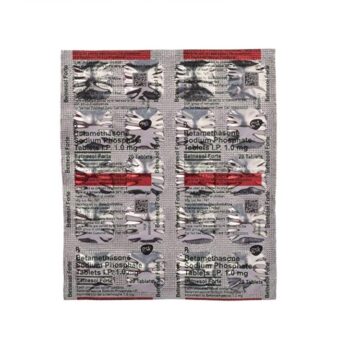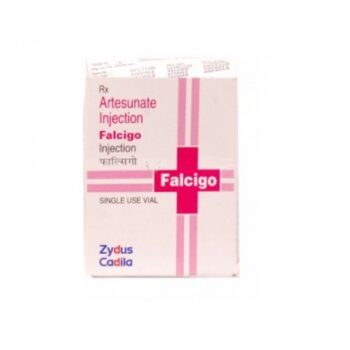Rapamune 1mg
Rapamune 1mg (generic name: sirolimus) is an immunosuppressant medication primarily used to prevent organ rejection in patients who have undergone kidney transplants. It works by inhibiting the activity of a protein called mTOR, which plays a crucial role in immune cell activation.
By suppressing the immune response, Rapamune helps prevent the body from attacking the newly transplanted organ. Additionally, it is used in the treatment of certain types of cancers and rare diseases.
Patients on Rapamune need regular monitoring for side effects like infections, high cholesterol, and liver issues, and should follow their doctor’s guidelines closely.
Uses
- Prevention of Organ Rejection – Primarily used to prevent kidney transplant rejection in patients by suppressing the immune system.
- Treatment of Lymphangioleiomyomatosis (LAM) – A rare lung disease in women, Rapamune can help manage symptoms and slow disease progression.
- Cancer Treatment – Sometimes used in the treatment of certain cancers, such as renal cell carcinoma.
- Other Conditions – Occasionally prescribed off-label for conditions requiring immunosuppression.
How to use it ?
Rapamune 1mg should be taken exactly as prescribed by your doctor. It is typically taken once daily, with or without food. The tablets should be swallowed whole, without crushing or chewing.
It is important to take it at the same time every day to maintain consistent levels in your body. Your doctor will monitor your progress with regular blood tests, checking for any signs of side effects or changes in organ function.
How dose it works ?
Rapamune 1mg (sirolimus) works by inhibiting a protein called mTOR (mechanistic target of rapamycin), which plays a critical role in regulating immune cell activation and proliferation.
By blocking mTOR, Rapamune suppresses the immune system’s response, preventing the body from attacking a transplanted organ (such as the kidney). This immunosuppressive action helps prevent organ rejection.
Additionally, it can slow the growth of certain types of cancer and manage diseases like lymphangioleiomyomatosis (LAM) by limiting abnormal cell growth.
Doses
- Kidney Transplantation:
- Initial dose: 6 mg once daily for the first 3 days post-transplant.
- Maintenance dose: After the initial dose, the typical maintenance dose is 1 to 2 mg daily, adjusted based on blood levels and the patient’s response.
- Lymphangioleiomyomatosis (LAM):
- The usual dose is 2 mg daily, with adjustments based on the patient’s tolerance and blood tests.
Benefits of Rapamune 1mg
- Prevents Organ Rejection – Effective in preventing kidney transplant rejection by suppressing the immune system, allowing the body to accept the new organ.
- Reduces Risk of Rejection in Other Transplants – Can be used for other types of organ transplants, including liver or heart transplants, in combination with other immunosuppressants.
- Treats Lymphangioleiomyomatosis (LAM) – Slows disease progression and improves lung function in women with this rare condition.
- Cancer Treatment – May help slow the growth of certain cancers, such as renal cell carcinoma.
- Promotes Long-term Graft Survival – In kidney transplant patients, it can contribute to long-term graft function and survival.
Side effects of Rapamune 1mg
- ncreased risk of infections – As it suppresses the immune system, it makes you more susceptible to bacterial, viral, or fungal infections.
- High cholesterol and triglycerides – Elevated levels of fats in the blood may require medication adjustments.
- High blood pressure (hypertension) – Rapamune can cause an increase in blood pressure.
- Mouth sores – Painful ulcers or sores in the mouth.
- Liver problems – Elevated liver enzymes, indicating possible liver stress or damage.
Serious side effects may include:
- Kidney problems – Decreased kidney function or kidney failure.
- Lung issues – Shortness of breath, cough, or lung infections.
- Anemia – Reduced red blood cell count.
- Elevated blood sugar – Can lead to or worsen diabetes.
Precautions
- Infections – Since Rapamune suppresses the immune system, it increases the risk of serious infections. Stay alert for signs of infection, such as fever or sore throat, and contact your doctor immediately if they occur.
- Kidney Function – Monitor kidney function regularly, as Rapamune can affect kidney health. Adjustments in dose may be needed for those with pre-existing kidney problems.
- Liver Health – Regular blood tests are needed to check liver function, as Rapamune can cause liver toxicity or elevated liver enzymes.
- Cholesterol and Blood Pressure – Rapamune can raise cholesterol and blood pressure. Lifestyle changes or medications may be necessary to manage these side effects.
- Pregnancy and Breastfeeding – It is not recommended during pregnancy and breastfeeding due to potential harm to the baby. Consult your doctor if you are planning to become pregnant or are breastfeeding.
- Avoid Live Vaccines – As Rapamune suppresses the immune system, live vaccines should be avoided during treatment.
- Drug Interactions – Inform your doctor of all other medications, as Rapamune can interact with certain drugs, including antifungals, antibiotics, and seizure medications, potentially altering its effectiveness or increasing the risk of side effects.
Frequently asked question
What is Rapamune 1mg used for?
Rapamune 1mg (sirolimus) is primarily used to prevent organ rejection after a kidney transplant. It is also used to treat lymphangioleiomyomatosis (LAM) and certain types of cancer, including renal cell carcinoma.
How should I take Rapamune 1mg?
Rapamune should be taken once daily, with or without food. Swallow the tablet whole, without crushing or chewing. Follow your doctor’s prescribed dosage and take it at the same time each day for consistency.
What are the common side effects of Rapamune 1mg?
Common side effects include increased risk of infections, high cholesterol, high blood pressure, mouth sores, and liver issues. Regular blood tests are necessary to monitor these effects.
Can Rapamune 1mg be taken with other medications?
Yes, but it can interact with other drugs, especially antifungals, antibiotics, and seizure medications. Always inform your doctor about any other medications you are taking to avoid interactions.
What precautions should I take while using Rapamune 1mg?
Monitor for infections, kidney problems, liver toxicity, and elevated cholesterol or blood pressure. Avoid live vaccines and consult your doctor if pregnant or breastfeeding. Regular check-ups and blood tests are crucial.
Can Rapamune 1mg be used during pregnancy or breastfeeding?
Rapamune is not recommended during pregnancy or breastfeeding due to potential risks to the baby. Always consult your doctor if you are planning to become pregnant or are breastfeeding.
What should I do if I miss a dose of Rapamune 1mg?
If you miss a dose, take it as soon as you remember. If it’s almost time for your next dose, skip the missed dose and continue your regular schedule. Do not double the dose to make up for a missed one.
How does Rapamune 1mg work in preventing organ rejection?
Rapamune works by inhibiting mTOR, a protein involved in the immune response. This suppression reduces the risk of the body attacking the transplanted kidney, helping it to be accepted and function properly.
How long should I take Rapamune 1mg ?
The duration of Rapamune treatment depends on the transplant type and the individual’s health. Typically, it is used long-term to prevent organ rejection, but your doctor will determine the exact duration based on your response to treatment.
Conclusion
Rapamune 1mg (sirolimus) is a crucial medication for preventing organ rejection in kidney transplant recipients and treating conditions like lymphangioleiomyomatosis (LAM).
It works by suppressing the immune system to prevent graft rejection while requiring careful monitoring for potential side effects, including infections and liver issues.












Reviews
There are no reviews yet.